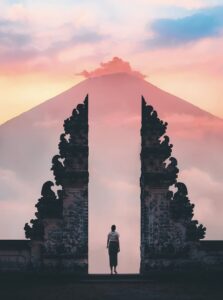Menu Apply

Located in South East Asia and comprised by thousands of volcanic islands, Indonesia is home to a huge range of ethnic groups that speak many different languages. It is renowned for its beaches, volcanoes and jungles, which are the home of elephants, tigers and dragons. The island of Java is home to Indonesia’s large and vibrant capital city, Jakarta, and the city of Yogyakarta, famous for Gamelan music and traditional puppets.
With its unspoiled beaches, pristine waters perfect for surfing and diving, lush mountains, endless rice terraces, volcanic slopes and spiritual culture and more, Indonesia often makes its way onto people’s bucket lists.
The temperatures are pleasant, ranging from 20 to 33 degrees Celsius all year-round. The wet season lasts from November to March, when the climate is humid and rainfall is common. However, this doesn’t generally stop people from visiting the country, as it tends to start raining in late afternoon or in the evening. As such, it is usually sunny in the day time. The climate is dry from June to September, during which period there isn’t much humidity in the air.

Indonesia is 7 hours ahead of Spain (peninsula time).

The official currency is the Indonesian rupee (IDR), with 1 euro equating to 14455 Indonesian rupees.

Indonesia is a collection of islands, which is why not all volunteer programs are located on the same island.

The stay begins as soon as the volunteer is picked up at the destination.For projects that start on a Sunday, the stay will finish on a Saturday. If the volunteer wishes to stay on the Saturday night, they will need to pay an additional cost of 35 euros.

The meals included in the project/destination will be provided at the accommodation. Meals will not be included for the journeys to the destination, the excursions undertaken by volunteers, etc.

The stipulated pick-up times for each destination/project must be respected. Volunteers who arrive outside of this day/window will have to pay an additional cost, depending on the destination.
Indonesia is a collection of islands, which is why not all volunteer programs are located on the same island.
On the island of Bali, in Ubud and Lovina, we find the orphanage programs, construction and renovation projects, health education, environmental education, sports program, puppy program, and English teaching program.
On the island of Nusa Penida, there is the turtle conservation and rehabilitation program.
On the island of Flores, we find Labuan Bajo, where the Komodo conservation volunteering and teaching project take place.
Costs
Volunteers should arrive on Sundays between 6:00 AM to 8:00 PM. The only exception is volunteers who are due to work in Nusa Penida, who need to arrive in Bali between 6:00 AM and 1:00 PM. Volunteers will be picked up by local staff and subsequently taken to their accommodation.
Indonesian food is tasty and diverse. During their stay, the volunteer can experience a huge range of flavours and dishes. Typical dishes include mie goreng (fried noodles and vegetables), nasi goreng (fried rice and vegetables) and gado gado (mixed vegetables with satay sauce). For volunteers who don’t eat meet, Indonesian cuisine features lots of tofu and tempeh (soya). Various western dishes can also be ordered. Breakfasts are varied, often including pancakes, fresh fruit and toast. Tea, coffee and purified water are available at the volunteer house. We don’t recommend drinking tap water.
By bus: Perama is the country’s most famous bus company, transporting visitors around Bali and other parts of Indonesia. Another popular bus company is Trans Sarbagita, with comfortable and air-conditioned vehicles. We recommend that volunteers book their ticket at least one day in advance, guaranteeing their place on the bus. There are also shuttle bus services that connect some of Bali’s most popular destinations.
By taxi: taxis are a popular way of getting around. Blue Bird / Bali Taksi are considered to be amongst the most trustworthy taxi firms, whose drivers often speak good levels of English (meaning you are more likely to be understood). They also offer a waiting service, at an additional fee, in which you can arrange for a driver to wait for you as you go sight-seeing and take you home as soon as you have finished.
In Ubud, volunteers can get around by foot, by bike or by rental motorbike.
The archipelago of Indonesia is located in the Indian and Pacific Oceans, comprising more than 18 thousand islands (of which one third are inhabited). It is the world’s largest archipelago.
One of its tourist attractions is the Komodo National Park, named after the Komodo dragon: the world’s largest reptile, which can grow up to 3 metres long and weigh up to 70 kg.
Another place to visit in Indonesia is Lake Toba, the world’s largest lake, which was shaped by volcanic eruptions. It was formed around 70 thousand years ago by an enormous volcanic eruption, of a magnitude that had never been seen before. The lake is 100 km long and 30 km wide.
The objective of the project is to train young people to be social leaders. The volunteers live in a multicultural environment, work as a team to develop tasks or institutional projects, accompany the beneficiaries in their daily lives or through workshops, and collaborate with the needs of the centers and homes.
Social Inclusion of children, young people and grandparents in situations of social risk.
Attention to Centers and Homes for the protection and restitution of rights of socially vulnerable children, adolescents and older adults.
The volunteers committed to the project will work alongside the community, involving different actors in society and allowing the full fulfillment of the rights of all people.
The children attending the Senggigi centre are currently taking their first steps in primary education. The opportunity to start learning English from such an early age will prove to be invaluable for them going forward.
Much like nurseries in any other country, the teaching style is informal. This is because the children will prefer to play with you rather than being “taught” by you. However, by making them excited to come to school and teaching them some very basic phrases, such as simple greetings, you may well have planted the seed for a habit of continuous learning.
The children will be delighted to see you and are sure to be exceptionally welcoming, partly because of the genuine and natural friendliness of Lombok natives. The working hours are subject to change, depending on climate conditions, local conditions and unforeseen circumstances.
This program will not run during the school holidays (June, July, August and December) and other bank holidays. Alternative activities may include conservation and restoration tasks and working on a school camp.
Location: Lombok Accommodation: Volunteers will stay in our houses in Senggigi.
Our health education volunteer program is geared towards children. This program requires the skills of qualified health professionals who are interested in teaching basic first aid skills and imparting personal hygiene advice.
Besides needing qualified health professionals to run health camps and perform dental check ups, we also need participants who can teach local people about basic first aid and hygiene such as how to correctly wash their hands, how to brush their teeth, etc.
Sanitary education is the best method of avoiding easily transmissible health problems and diseases. By participating on the health education volunteer program, you’ll help our team of local professionals to educate local families and children in the field of health. The working hours are subject to change, depending on climate conditions, local conditions and unforeseen circumstances.
The working days may vary during the school exam period, local holidays and school holidays (in Spring, summer or at Christmas). Alternative activities may include the nursery volunteer prograam, conservation tasks, community cleaning and restoration tasks or working on a school camp.
Location: Lombok Accommodation: Volunteers will stay in our houses in Senggigi.
Despite being an Indonesian island, Flores is still trying to keep up with the rest of the country. As such, the support required to improve the standard of living of local people is higher and more necessary on this island. The education system is similar to the rest of the island; however, the need for better educational facilities is evident.
The objective of our teaching volunteer program is to provide support to children in Flores, with a specific focus on improving their skills and knowledge of the English language.
You’ll have the freedom to be creative and design your own lesson plans within a relaxed atmosphere, combining the local way of doing things. You can help to improve the students’ knowledge of English, helping them to gain confidence in their use of the language.
The working hours are subject to change, depending on climate conditions, local conditions and unforeseen circumstances.
The working days may vary during the school exam period, local holidays and school holidays (in Spring, summer or at Christmas). Alternative activities may include the nursery volunteer program, conservation tasks, community cleaning and restoration tasks or working on a school camp.
Location: Lombok
This project seeks to support community centres in rural villages, such as the village school, the playground, the public library, etc. Together, we’ll help to make a huge difference for the villages and the local children, helping to improve their living conditions.
The objective of the construction and renovation volunteer program is to support small communities across the island. In, we seek to build and renovate buildings which are essential for the growth and development of the local community. Participants on the project will work under the supervision of a local coordinator, who will provide orientation and training alongside local families.
This program entails physical work and intense manual labour, as it involves laying bricks, doing carpentry work, painting, laying tiles and doing gardening work.
The working hours are subject to change, depending on climate conditions, local conditions and unforeseen circumstances.
Location: Lombok Accommodation: Volunteers will stay in our houses in Senggigi.
When volunteers arrive at the airport, they will be picked up by the local coordinator and taken to the volunteer house, where they will spend the following days with their fellow participants.
In the volunteer house, volunteers will be given three meals a day from Monday to Friday and two meals a day on Saturday and Sunday.
There are various 4-6 person bedrooms in the volunteer house. The bathroom and communal areas are shared amongst all volunteers staying at the accommodation.
After arriving and settling in, a welcome meeting will be held with the local coordinators and professionals. During this meeting, the volunteers will be given information about the area, the standard rules and schedules, and to provide further information about the program that they’re going to work on.
Indonesian food is tasty and diverse. During their stay, the volunteer can experience a huge range of flavours and dishes. Typical dishes include mie goreng (fried noodles and vegetables), nasi goreng (fried rice and vegetables) and gado gado (mixed vegetables with satay sauce). For volunteers who don’t eat meet, Indonesian cuisine features lots of tofu and tempeh (soya). Various western dishes can also be ordered. Breakfasts are varied, often including pancakes, fresh fruit and toast. Tea, coffee and purified water are available at the volunteer house. We don’t recommend drinking tap water.
The total cost of the volunteer program is divided into 2 parts. The registration fee that is paid to book your placement in the program costs €210, and the program cost, which is paid afterward.
€420 for 2 weeks
€210 for each additional week thereafter
€420 for 2 weeks
€210 for each additional week thereafter
€490 for 2 weeks
€245 for each additional week thereafter
€420 for 2 weeks
€210 for each additional week thereafter
Visa, flights, travel insurance (obligatory), vaccines, return to the airport, and other personal expenses.
(*** los voluntarios en Kenia generalmente encuentran que con 18 € (US$ 25, aprox.) es suficiente para los gastos semanales básicos).
| Address: | New York, United States |
| Address: | Avinguda Carrilet, 3, Edifici D, planta 2a, 08902 L’Hospitalet de Llobregat (Barcelona) |
| Phone: | +34 931 890 904 - Office- Barcelona |
| Email: | hello@cooperatingvolunteers.com |
| WhatsApp: | +34 671 94 28 89 |

Cooperating Volunteers, S.L. All rights reserved © 2014
Leave us your information and we will contact you within the next 24 hours
Our volunteers will be able to validate university credits with the aim of traveling in a more responsible and economical way.
What does volunteering focused on university practices involve?
At Cooperating Volunteers, we make agreements with different universities to validate university credits with the aim of traveling in a more responsible and economical way.
The specialties we work with are extensive: medical volunteering, nursing, education, social work, psychology, physiotherapy, engineering, architecture…
The practices can be carried out in our designated destinations for this purpose, as well as in Spain.
If you choose an international destination, it’s a unique way to live an unforgettable and enriching experience, as you will have the opportunity to continue your education in another country, with a completely different culture.
Stepping out of our comfort zone and being part of the various projects at the destination will allow us to grow both personally and professionally, creating a more extensive curriculum.
And we are fully convinced that this experience will accompany you throughout your life.
You will be able to visit hospitals, schools, centers, orphanages, and participate directly and actively in the daily lives of all those people at the destination, always accompanied by other professionals willing to collaborate hand in hand with you and guide you in daily tasks.
If your university is not part of the agreement with Cooperating Volunteers, you can contact cristina@cooperatingvolunteers.com so that we can get in touch and make this experience a reality.
Corporate volunteering consists of tailored programs for your company, designed to develop teamwork skills.
It is proven that teamwork directly impacts productivity.
Collective effort surpasses individual capabilities, promotes diversity of skills, stimulates creativity, and facilitates problem-solving in the face of various challenges.
Therefore, it not only maximizes efficiency but also enriches the work environment.
We conduct corporate volunteering programs that consist of customized programs for your company, designed to develop teamwork skills, improve performance, and foster unity among employees.
We tailor projects to the corporate identity and size of the company, and we can adjust them to any destination and time of the year.
The advantages of corporate volunteering include:
The future is aligned with a more responsible society, and participating in social projects positions our company among the list of revolutionary businesses that want to be part of the change.
If you resonate with this message, corporate volunteering is a unique experience both individually and collectively, and at Cooperating Volunteers, we accompany you throughout the process to make it a unique journey.
Quality time spent with family strengthens emotional bonds, promotes communication, and contributes to the emotional well-being of its members.
Spending quality time with family and being able to disconnect from our hectic routines is not only enriching but also necessary.
Sometimes we forget to communicate, connect, and dedicate time to each other. Each one of us lives focused on our jobs, schools… And it’s necessary to find the opportunity to pause and take care of ourselves.
Quality time spent with family strengthens emotional bonds, promotes communication, and contributes to the emotional well-being of its members. And of course, it creates lifelong positive memories.
At Cooperating Volunteers, we suggest moving away from those ‘more superficial’ trips (which can also be fantastic), but we invite you to live this experience to bring out our most empathetic and humanitarian side.
Family volunteering gives us the opportunity to be part of a positive impact, promoting values of solidarity and social responsibility.
There are many families who choose to experience these trips focused on cooperation and direct involvement with different communities around the world, where living conditions are very different and sometimes entirely precarious.
Projects are tailored to different ages, allowing us to work together.
An incredible way to fill our suitcase with memories, learning, and knowledge.
And although stepping out of our comfort zone often feels daunting, we assure you firsthand that it’s worth it.
At Cooperating Volunteers, we accompany you throughout the entire experience, from start to finish, to make it unforgettable.
At Cooperating Volunteers, we believe it’s never too late for anything, especially for volunteering and living a unique and unforgettable experience.
There are many people, increasingly so, who opt for responsible travel that involves social work.
Accustomed to organized and mostly touristic trips, at Cooperating Volunteers, we want to advocate for a more enriching experience, one that transforms us from within and allows us to be part of the change the world needs to see.
We can adapt both the destination and the duration of our projects to fit your needs.
It’s an opportunity full of emotions that allows us to significantly contribute to different communities and their evolution. And you can participate in different areas such as education, social support, or assistance in different centers.
Some of the benefits include:
Living this experience will undoubtedly be a before and after.
A volunteering initiative with leadership and impact through the educational action program.
When we talk about social volunteering, we refer to all those actions and activities carried out altruistically, selflessly, and with the aim of addressing multiple problems and needs of different communities, always focused on education and self-sufficiency.
Education is essential because it provides the tools and knowledge necessary for personal, social, and economic development.
Our goal is to create self-sufficient communities and provide opportunities for the future personal development of each member. The message is not to ‘give’, but to accompany in the process of training for self-managed provision.
At Cooperating Volunteers, many of our destinations and projects embrace this type of volunteering. Some of our projects include: community programs, education, women’s empowerment…
And although they are completely different from each other, they share a single objective: progress towards a society that can embrace us all in the same way.
If you are someone who is restless, who needs to see a change in the future, volunteering is an experience tailor-made for you.

